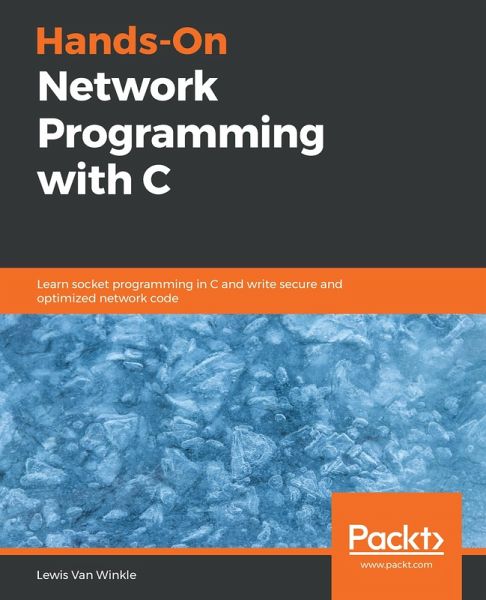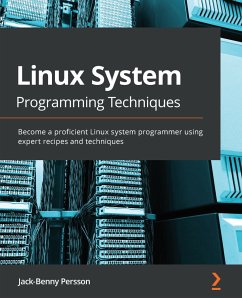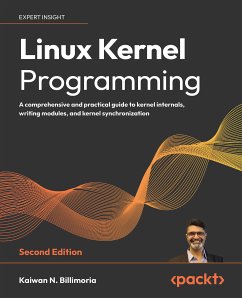
Hands-On Network Programming with C (eBook, ePUB)
Learn socket programming in C and write secure and optimized network code
Versandkostenfrei!
Sofort per Download lieferbar
39,40 €
inkl. MwSt.
Weitere Ausgaben:

PAYBACK Punkte
0 °P sammeln!
A comprehensive guide to programming with network sockets, implementing internet protocols, designing IoT devices, and much more with CKey FeaturesApply your C and C++ programming skills to build powerful network applicationsGet to grips with a variety of network protocols that allow you to load web pages, send emails, and do much moreWrite portable network code for Windows, Linux, and macOSBook DescriptionNetwork programming enables processes to communicate with each other over a computer network, but it is a complex task that requires programming with multiple libraries and protocols. With i...
A comprehensive guide to programming with network sockets, implementing internet protocols, designing IoT devices, and much more with C
Network programming enables processes to communicate with each other over a computer network, but it is a complex task that requires programming with multiple libraries and protocols. With its support for third-party libraries and structured documentation, C is an ideal language to write network programs.
Complete with step-by-step explanations of essential concepts and practical examples, this C network programming book begins with the fundamentals of Internet Protocol, TCP, and UDP. You'll explore client-server and peer-to-peer models for information sharing and connectivity with remote computers. The book will also cover HTTP and HTTPS for communicating between your browser and website, and delve into hostname resolution with DNS, which is crucial to the functioning of the modern web. As you advance, you'll gain insights into asynchronous socket programming and streams, and explore debugging and error handling. Finally, you'll study network monitoring and implement security best practices.
By the end of this book, you'll have experience of working with client-server applications and be able to implement new network programs in C.
The code in this book is compatible with the older C99 version as well as the latest C18 and C++17 standards. You'll work with robust, reliable, and secure code that is portable across operating systems, including Winsock sockets for Windows and POSIX sockets for Linux and macOS.
If you''re a developer or a system administrator who wants to get started with network programming, this book is for you. Basic knowledge of C programming is assumed.
Key Features
- Apply your C and C++ programming skills to build powerful network applications
- Get to grips with a variety of network protocols that allow you to load web pages, send emails, and do much more
- Write portable network code for Windows, Linux, and macOS
Book Description
Network programming enables processes to communicate with each other over a computer network, but it is a complex task that requires programming with multiple libraries and protocols. With its support for third-party libraries and structured documentation, C is an ideal language to write network programs.
Complete with step-by-step explanations of essential concepts and practical examples, this C network programming book begins with the fundamentals of Internet Protocol, TCP, and UDP. You'll explore client-server and peer-to-peer models for information sharing and connectivity with remote computers. The book will also cover HTTP and HTTPS for communicating between your browser and website, and delve into hostname resolution with DNS, which is crucial to the functioning of the modern web. As you advance, you'll gain insights into asynchronous socket programming and streams, and explore debugging and error handling. Finally, you'll study network monitoring and implement security best practices.
By the end of this book, you'll have experience of working with client-server applications and be able to implement new network programs in C.
The code in this book is compatible with the older C99 version as well as the latest C18 and C++17 standards. You'll work with robust, reliable, and secure code that is portable across operating systems, including Winsock sockets for Windows and POSIX sockets for Linux and macOS.
What you will learn
- Uncover cross-platform socket programming APIs
- Implement techniques for supporting IPv4 and IPv6
- Understand how TCP and UDP connections work over IP
- Discover how hostname resolution and DNS work
- Interface with web APIs using HTTP and HTTPS
- Explore Simple Mail Transfer Protocol (SMTP) for electronic mail transmission
- Apply network programming to the Internet of Things (IoT)
Who this book is for
If you''re a developer or a system administrator who wants to get started with network programming, this book is for you. Basic knowledge of C programming is assumed.
Dieser Download kann aus rechtlichen Gründen nur mit Rechnungsadresse in A, B, BG, CY, CZ, D, DK, EW, E, FIN, F, GR, H, IRL, I, LT, L, LR, M, NL, PL, P, R, S, SLO, SK ausgeliefert werden.













